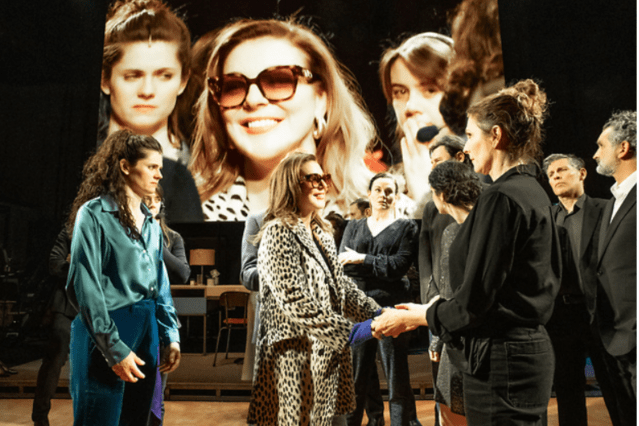Opening Night with Sheridan Smith in the West End review – a baffling waste of talent
John Cassavetes’s film becomes a stage musical

Ivo van Hove is a director who likes building boxes within boxes, refracting images of recess, mingling fantasy and reality, blurring the boundaries between artifice and truth. He also likes adapting films for the stage (Obsession, Network for example) and creating plays about theatre itself (most notably All About Eve).
All of which goes some way to understanding why he wanted to turn John Cassavetes’s Opening Night into a stage musical. But it doesn’t explain for a second why the result is such a confusing mess. Despite a score by Rufus Wainwright, a hugely popular star in the shape of Sheridan Smith and a cast who work their hearts out in the interests of trying to salvage something from the wreckage, this is a show that mystifyingly seems to fail from the moment it begins.
Cassavetes’s movie, which has acquired a cult status since its release in 1977, may be offbeat and disconcerting in its portrayal of a theatre company working up to its Broadway opening night, but within its affectless, nuanced narrative is a clear plot. This centres on Myrtle, an actress who loses her grip on sanity as she rehearses a play – The Second Woman – which asks her to confront the passage of time and her own ageing. Her near breakdown is aggravated by the death of an obsessed fan, who dies in a road accident just after Myrtle has given her an autograph.
In transferring the film to the stage, Van Hove, who is adaptor as well as director, deliberately disrupts an already jagged story still further – introducing a documentary film crew who beam the cast’s reactions onto huge screens. Sometimes the screen shows what we are seeing on stage, sometimes it is a little behind. And sometimes, confusingly, it moves our attention to an action that is happening at the edge of things.
The focus is always shifting, so that there is never an opportunity to get to understand any character before the next development lands. At the same time, Jan Versweyveld’s cluttered set, with mirrors and a table where the crew meet and chat, often doesn’t differentiate between scenes onstage in the play within the play that is being previewed to an audience, and the chaos backstage that is caused by Myrtle’s meltdown.
Wainwright’s music – rather well played by an offstage band – also veers wildly in tone. It opens with Smith’s Myrtle singing about her need to be loved in true showtune style, flings in some banjo plucking for “Magic” and sad guitar for “Married”, a song for the director’s neglected wife. What it never provides is a truly memorable melody or a song that carries the meaning of the show. It’s not unattractive, but it is never essential.
The same thing happens to Van Hove’s direction, normally both precise and intelligent. Here it seems to sprawl, as if the whole concept is escaping his grasp. About three different stories grapple for attention – one (arguably the most interesting) is about Myrtle’s haunting by bolshie Nancy, who Shira Haas brings to terrifying, agonised life. The second concerns Myrtle’s disintegration and her relationships with her ex-husband and co-star Maurice (Benjamin Walker), the despairing director Manny (Hadley Fraser) and the lovelorn producer David (John Marquez).
The third, about her battles with the playwright Sarah (Nicola Hughes) over what it means to be a woman of a certain age is the least well developed, though it produces one of the best songs – “Life is Thin” – which is both over-intrusive (with Hughes’ face huge above the action) and under-explained (since it is the number that comes closest to asking the big questions about life and art that are the subject of the Cassavetes film.)
In the midst of all this, Smith battles gamely, singing well, but struggling to gain much purchase on the character. In some ways her casting must have seemed like another piece of meta-theatre – Myrtle’s complaints about intrusion and fear of failure appear to mirror Smith’s own challenges. But she struggles to make a mark with the dislocations in script and character.
Around her, an excellent supporting cast also do their best. Walker is charismatic and funny as Maurice, and even manages to deliver some of Wainwright’s most elaborate lyrics – ‘I’m not saying I’m not grateful/For all the sadness you weave through my maypole’ – with something like conviction. But Fraser is almost entirely wasted as Manny and Amy Lennox has too little to do as his wife Dorothy (a fault inherited from the film.)
In the second half, the efforts of the entire ensemble actually bring about a measure of coherence. It’s not the least engaging evening of musical theatre I’ve ever sat through, but it is one of the most baffling wastes of talent.















